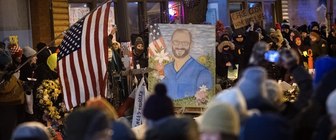When pollsters at YouGov want to show how American views on an issue differ across the political spectrum, we frequently break out respondents by their responses to a question about ideology — are they "liberal," "moderate," or "conservative"?
But these commonly used ideological labels don't sit well with some people. For example, while the term "liberal" is often used in the U.S. as a synonym for left-of-center, it also has different definitions that can exclude some people on the left and include some people on the right.
YouGov asked Americans to place their political views on a scale from "very liberal" to "very conservative" — and also on a scale from "far left" to "far right."
Overall, around 26% of Americans describe themselves as "liberal" or "very liberal," and another 32% describe themselves as "moderate." 33% describe themselves as "conservative" or "very conservative."
That roughly matches up with where Americans place themselves on a left-right spectrum. 27% of U.S. adult citizens say their politics are "far left," "left," or "center-left," while 24% say their politics are "center," and 34% say they're "far right," "right," or "center-right."
Americans' self-placement on the liberal-conservative spectrum roughly lines up with how they place themselves on the left-right spectrum, but there are some exceptions. 55% of the "very liberal" describe themselves as "far left," similar to the 46% of the "very conservative" who say they're "far right" and the 55% of moderates who say they're in the "center."
Americans who describe themselves as "liberal" are more likely to say their political viewpoint is "left" or "center-left" than are those who call themselves "very liberal." Likewise, those who say they're "conservative" are more likely to say they're "right" or "center-right" than are those who call themselves "very conservative."
Only 5% of those who say they're "liberal" (but not "very liberal") call themselves "far left," and only 3% of those who say they're "conservative" (but not "very conservative") say they're "far right."
71% of Americans who aren't sure where they lie on a liberal-conservative scale also say they aren't sure where they fall on a left-right scale. The other 29% fall across the political spectrum: 6% say they are left-of-center, 9% say they are right-of-center, and 14% say their politics are centrist.
Looked at in reverse, 79% of Americans who call themselves "far left" describe themselves as "very liberal," compared to 26% of the "left" and 1% of the "center-left." 77% of the "far right" say they're "very conservative," as do 26% of the "right" and 6% of the "center-right."
70% of centrists say their politics are "moderate," as do 45% of the "center-left" and 36% of the "center-right." Less than 10% of the far left, left, right, and far right each call themselves moderate.
Most Americans (76%) say the word "liberal" always or sometimes means someone whose politics are on the left side of the political spectrum; only 6% say it never does. But there are big differences between those who say liberal always means left (41% of all U.S. adult citizens) and those who say it sometimes does (48%).
Right-of-center Americans are especially likely to say that "liberal" is a synonym for left: 63% say that, compared to 28% who say it only sometimes is. Left-of-center Americans are more split: 45% say "liberal" always means left and 48% say it doesn't. Centrists are much more likely to be not sure (25%) or to say "liberal" sometimes means left (40%) than to say it always does (27%).
Methodology: This article includes results from online surveys conducted November 18 - 20, 2024, December 19 - 21, 2024, and December 20 - 23, 2024, among 3,288 U.S. adult citizens. Respondents were selected from YouGov’s opt-in panel to be representative of adult U.S. citizens. The sample was weighted according to gender, age, race, education, 2024 presidential vote, 2020 election turnout and presidential vote, baseline party identification, and current voter registration status. 2024 presidential vote, at time of weighting, was estimated to be 48% Harris and 50% Trump. Demographic weighting targets come from the 2019 American Community Survey. Baseline party identification is the respondent’s most recent answer given around November 8, 2024, and is weighted to the estimated distribution at that time (31% Democratic, 32% Republican). The margin of error for the overall sample is approximately 2.5%.
Image: Getty (PM Images)
What do you think about the election, American politics in general, and everything else? Have your say, join the YouGov panel, and get paid to share your thoughts. Sign up here.









